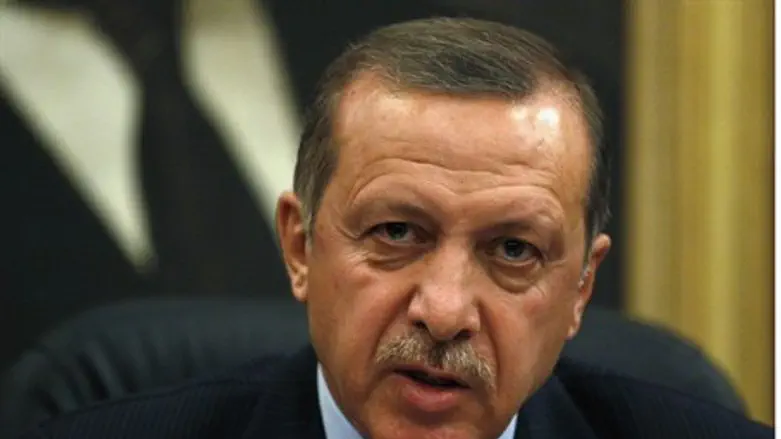
A day after Israel apologized to Turkey over the Mavi Marmara incident, its Prime Minister Recep Tayyip Erdogan announced on Saturday that he will visit Gaza.
“I may eventually visit Gaza and the West Bank in April. This visit would take place in the context of a general effort to contribute to the resolution process,” Erdogan told reporters, according to a report in the Turkish daily Hurriyet.
Hamas’s Prime Minister in Gaza, Ismail Haniyeh, had already announced on Friday that Erdogan would visit Gaza in the near future, the report said.
Hamas spokesman Taher al-Nunu had confirmed that "Recep Tayyip Erdogan will soon visit the Gaza Strip where he will meet with Prime Minister (Haniyeh)," according to the Hurriyet.
Nunu reportedly said that Erdogan had called Hamas leader Khaled Mashaal "to tell him Israel had accepted Turkey's conditions: apologies for the murder of the Turkish militants, recognition of (Israel's) responsibility and the lifting of the embargo.”
Erdogan also said that the reconciliation with Israel and the prospect of a resolution of the conflict between Hamas and Palestinian Authority Chairman Mahmoud Abbas’s rival Fatah party could accelerate Syrian President Bashar al-Assad’s fall.
According to the Hurriyet, Erdogan emphasized the fact that Israeli Prime Minister Binymain Netanyahu had used the word “apology” and not “regret” in the formal document, adding that the statement was issued in accordance with Turkey’s expectations.
He explained that after Netanyahu’s phone call, they had agreed that the first statement would come from Israel.
“In the end the United States made it public, then Israel confirmed and we announced that we accepted the apology,” he said, adding that Israel had shown willingness to issue an apology and compensation in the past but that Turkey had insisted on the abolishment of the Gaza blockade.
At the same the Turkish leader was cautious regarding the restoration of diplomatic ties by the appointment of ambassadors.
“We will see what will be put into practice during the process. If they move forward in a promising way, we will make our contribution. Then, there would be an exchange of ambassadors,” he said, adding that the amount of the compensation would be determined by the competent bodies.
"We took a stand but we managed to resolve the process without being [overly] intractable," he concluded. "We are at the beginning of a process of elevating Turkey to a position so that it will again have a say, initiative and power, as it did in the past."
On Friday, Netanyahu apologized to Erdogan for the 2010 raid on a Gaza-bound flotilla, during which nine Turks were killed after they attacked IDF soldiers who boarded the Mavi Marmara which attempted to break the naval blockade on Gaza.
Netanyahu, in addition to the apology, has reportedly agreed to compensate the families of the nine Turks who were killed and to ease some of the restrictions on Gaza.
Erdogan, for his part, has promised to cancel the legal proceedings his country launched against IDF officials, including former Chief of Staff Gabi Ashkenazi, and stop his constant verbal attacks against Israel.
On Saturday night, Netanyahu explained in his Facebook page why he chose to apologize to Erdogan, saying that the deteriorating situation in Syria was the main reason.
"After three years of a disconnect in Israeli-Turkish relations," he wrote, "I decided that this is the time to rebuild them."
The reparation of relations between Israel and Turkey was hailed by U.S. Secretary of State John Kerry as a vital factor in developing peace and stability in the Middle East.